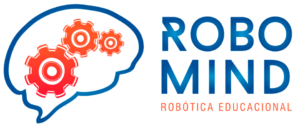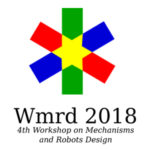PROGRAMME
| Horário | 20 – Setembro | 21 – Setembro |
| 08:00 – 08:30 | Reception | Projeto de um robô paralelo para auxiliar na reabilitação do tornozelo; Lecturer: Pedro Arthur Cogliatti. |
| 08:30 – 09:00 | Dimensional synthesis of the single-loop translational parallel manipulator PRRR-PRPU; Lecturer: Henrique Simas | |
| 09:00 – 09:30 | Opening Session: Daniel Martins, Herique Simas, Daniel Ponce, Leonardo Mejia, Mauri Ferrandin, Adriano Péres, Ebrahim Samer El Youssef, Marcelo Petri. | Plenary Lecture: An academic journey among people, mechanisms and robots; Keynote Speaker: Daniel Martins. |
| 09:30 – 10:00 | Plenary Lecture: Neuroengineering – from neurons
to robotics; Keynote Speaker: Fabricio Brasil. |
|
| 10:00 – 10:30 | Modular suturing catheter for minimally invasive vascular surgery; Lecturer: Estevan Hideki Murai. | |
| 10:30 – 11:00 | Dimensional Synthesis of the Backrest Mechanism of a Hospital Bed Using the Davies’ Method; Lecturer: Rodrigo Luís Pereira Barreto. | Biomechanics and assistive technologies; Lecturer: HélioRoesler. |
| 11 : 00 – 11:30 | Shaking force and moment minimization of a four-bar mechanism using differential evolution algorithm; Lecturer: Julio Cesar Frantz. | Aplicações da pneutrônica na industria de controle e automação; Lecturer: Henrique Marchi Lange. |
| 11:30 – 12:00 | Structural and Functional Criterias for Synthesis of Mechanism for bedridden Patients; Lecturer: Elias RenãMaletz. | Sensores térmicos obtidos de compósitos poliméricos e nanotubos de carbono; Lecturer: Alexandre José Sousa Ferreira. |
| Horário | 20 – Setembro | 21 – Setembro |
| 14:00 – 14:30 | Reverse engineering of automatic automotive gearboxes by using graph and screw theories; Lecturer: Marina Baldissera de Souza. | Parallel robot workspace analysis; Lecturer: Luis Garcia |
| 14:30 – 15:00 | Methodology to design innovative variable stiffness actuators; Lecturer: Fabíola da Silva Rosa. | Mobile autonomous robot; Lecturer: Luiz Buzzi |
| 15:00 – 15:30 | Simulation of a system support for an end-effectorrehabilitation robot;
Lecturer: Eliseo Cortés Torres. |
Artificial Heart Design; Lecturer: Eduardo Bock |
| 15:30 – 16:00 | Universal testing machine project, design and construction; Lecturer: Eduardo Szpoganicz. | Plenary Lecture: Technological innovations in industrial automation; Lecturer: Junior Souza. |
| 16:00 – 16:30 | Biomechanics and the main elements for a 7 DoF human arm model; lecturer: Gustavo Queiroz Fernandes. | |
| 16:30 – 17:00 | Model-based viewpoint path planning for underwater inspection of 3D complex structures using octomap; Lecturer: Bruno Locks Floriani. | Round table – Robotics and education
(Session Exclusively in Portuguese) Mesa redonda – Robótica e educação (Sessão exclusivamente em Português) |
| 17 : 00 – 17:30 | Design and mathematical modeling of a tilting-rotor UAV for environment interaction tasks; Lecturer: Julio CezarVendrichoski. | Closing session. |
| 17:30 – 18:00 | Modeling and Control of an Unmanned Aerial Vehicle; Lecturer: Thamiris Lima Costa. |
Robomind exhibition:
RoboMind is software specifically developed to support technology education. By programming a robot, students learn about logic, computer science and robotics. The beauty of RoboMind is the compactness of the learning environment. It directly connects logical thinking to solving challenges encountered in daily life and industry. RoboMind is used all over the world.
Robomind will be exhibiting some of their products in this fourth workshop on mechanisms and robot design – Date: 20/09/2018, from 14:00 to 18:00 – Beside the auditorium in Block B.

Minicourse # 1: Artificial Intelligence – Prof. Marcos Matsuo:
Neural networks and deep learning currently provide very good solutions to many problems in computer vision, speech recognition, and natural processing language. In particular, such solutions have been widely used to enhance the navigability of autonomous vehicles and the interactive skills of personal assistant systems (as, Siri and Alexa). Thus, aiming to present an introduction to the growing field of deep learning, Professor Marcos Matsuo is offering a mini-course to introduce the core concepts of the theory behind neural networks. During the mini-course, a neural network capable of recognizing handwritten digits will be implemented using Matlab software. The target audience is undergraduate students interested in the machine learning field who have concluded Calculus II and are familiar with Matlab. Date: 20/09/2018, from 13:30 to 18:00. Room: A003 – Vasto Verde.
LIST OF ACCEPTED PARTICIPANTS – MINICOURSE 1
Minicourse # 2: Non-invasive brain-machine interfaces fundaments – Prof. Fabricio Brasil: (Closed-inscriptions)
Professor Fabrício Lima Brasil is Researcher in Neuroengineering with a high experience in field of Biomedical Engineering, Brain Machine/Computer Interface (BMI/BCI), Rehabilitation of stroke survivals and spinal cord injury (SCI) patients, autism spectrum disorder (ASD), Development of Devices, Plasticity and Brain Stimulation techniques, like: Transcranial Magnetic Stimulation (TMS) and Transcranial Direct Current Stimulation (tDCS). Professor Fabrício is researcher at the “Walk Again Project” together with Professor Miguel Nicolellis and is coordinator of the Post-Graduation Program in Neuroengineering of the Edmond and Lily Safra International Institute of Neuroscience (ELS-IIN), from the Santos Dumont Institute (ISD).
Date: 21/09/2018, from 15:00 to 17:00. Room: A202 – Bloco A.
LIST OF ACCEPTED PARTICIPANTS – MINICOURSE 2




